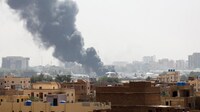Lt. Gen. Abdel Fattah al-Burhan, commander of the Sudanese armed forces and the de facto head of state, oversees a long-standing network of private and state-sponsored companies that has given the military and its allies control over large segments of the country’s economy, according to analysts who have documented this network. These economic holdings provide an important source of patronage for Burhan.
Gen. Mohamed Hamdan Dagalo, universally referred to Hemedti, controls a sprawling family business involved in a range of industries — most notably gold mining in the Darfur region — that are intertwined with the paramilitary Rapid Support Forces, or RSF, which he commands, the analysts say. These activities also provide him with a vital source of patronage.
“The way you run Sudan is you pay for a coalition, either in cash or in licensing or in tying them into your kleptocratic network,” said Alex de Waal, executive director of the World Peace Foundation at Tufts University. “If you understand the political marketplace, you understand Sudan.”
Altayeb Osman Yousef, who heads an official Sudanese committee that has examined how to dismantle the role of the security forces in the economy, said that military-owned companies account for a quarter of the country’s gross domestic product and the RSF’s enterprises account for about half. Yousef said his committee’s investigation into companies owned by the security forces — and their fear that their wealth could be in jeopardy — had helped precipitate the coup led by Burhan and Hemedti two years ago against Sudan’s joint civilian-military government.
In addition to building their own economic empires, the military and RSF have also engaged in business dealings with Russia’s paramilitary Wagner Group, which has sought to become more active in Sudan.
Long-simmering rivalries between the two generals over power sharing and the integration of RSF into national forces intensified during the past three months under the pressure of a draft agreement addressing these issues.
Since fighting erupted, a nonstop barrage of airstrikes and fire from tanks, mortars and artillery have incinerated buildings, pushed hospitals to collapse and left streets strewn with bodies. Terrified families are trapped in their homes without electricity, food or water, with temperatures exceeding 100 degrees. Windows have been sealed against stray bullets and the stench of death.
On Tuesday, U.S. Sen. James E. Risch (R-Idaho), the ranking Republican member of the Senate Foreign Relations Committee, called for sanctions on both men. Neither has so far faced sanctions for their joint 2021 coup that overthrew the previous government, which included civilians, or their security forces’ role in gunning down pro-democracy demonstrators.
Any sanctions imposed in an effort to end the fighting would have to take into account the economic interests of the two generals and areas where they might be vulnerable to pressure.
The military headed by Burhan directly controls a significant array of manufacturing and import-export activities, de Waal said. Many enterprises, including those involved in banking, telecommunications, oil production and construction, are in the hands of Islamists aligned with the military.
The Center for Advanced Defense Studies, a Washington-based organization that examined hundreds of state-sponsored enterprises, said actual control of these firms is often hidden behind several layers of corporate ownership.
The military’s economic interests have made it reluctant to step back from power and accede to the demands of pro-democracy protesters, analysts say. “The biggest problem in terms of the military is that they control so much of the economy … which they are not prepared to relinquish through a transfer of power to a civilian government,” said Matt Bryden, founder of the Nairobi-based think tank Sahan Research.
Hemedti, for his part, comes from a wealthy trading family previously involved in livestock exports and consumer imports, said Suliman Baldo, an expert in conflict financing in Sudan. Then war exploded in Hemedti’s home region of Darfur in 2003 and business dried up, Baldo said.
Hemedti joined the Janjaweed, a pro-government militia that fought against the Darfur rebels. As Hemedti rose through the ranks, he was rewarded with contracts, including to build roads in Darfur, Baldo said. Eventually, the Janjaweed became the RSF.
The Dagalo family jumped into a gold rush that took off in 2012 and diversified into livestock, real estate, banking and other minerals, he said.
In 2017, the RSF forcibly cleared the Jebel Amer area in Darfur. Shortly afterward, the government awarded extensive mining concessions in Jebel Amer to Al Gunade, a large gold-trading and construction group owned by one of Hemedti’s brothers, Abdul Rahim Dagalo — who is also the deputy head of the RSF — and Abdul Rahim’s two young sons, according to Global Witness, a conflict finance watchdog. The group said the company has “captured a [swath] of the country’s gold industry and are likely using it to fund [RSF] operations.”
Abdul Rahim Dagalo did not return messages seeking comment.
Global Witness also identified two other companies controlled by another of Hemedti’s brothers that have a history of doing business with the RSF.
Despite the tensions between Burhan and Hemedti, the military and RSF have not been business rivals and have not interfered with each other’s investments, according to Arif Elsawi, director of Sudan Facts, a Sudanese investigative journalism center. In some instances, the two sides have even cooperated, with Burhan for example giving Hemedti a 30 percent stake in the state-run defense company, Sudan’s Military Industry Corporation, according to a Sudanese press report confirmed by a company employee.



